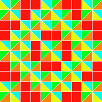Let $A$ be the finite alphabet $A=\{0,1,\dots,q-1\}$. Given an infinite word $w\in A^{\mathbb N}$ and $n\in \mathbb N$, we denote by $p_w(n)$ the number of factors of size $n$ of $w$. Given a function $f: \mathbb N \to (0,+\infty)$, we denote by $W(f)$ the set of infinite words $w\in A^{\mathbb N}$ such that $p_w(n)\le f(n), \forall n \in \mathbb N\}$. We associate to it the set of real numbers $C(f)=\{\sum \limits_{n \ge 0} \frac{w_n}{q^{n+ 1}}; \, w(x) = {w_0}{w_1}\cdots{w_n}\cdots \in W(f)\}$. We will discuss results on the combinatorics and the fractal geometry of the sets $W(f)$ and $C(f)$ for functions $f$ of exponential growth, which correspond to infinite words with positive entropy. We will also recall previous works on the zero entropy case.
This is a joint work with Christian Mauduit.

 PDF version
PDF version
